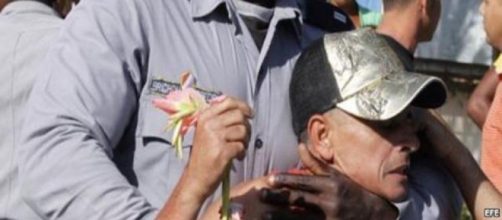Althought Cuba was one of the signatories (and in fact, one of the major authors) of the "United Nations Universal Declaration of Human Rights," it has never taken back that approval. After more than 50 years of Cuban Revolution, the rights of freedom of speech, press, association, travel, peaceful assembly, due process of law, fair trial, voting, and political action continue to be severely limited. The argument presented by the Cuban government is that since the Communist Party is the Party of the People, any other political party must, by definition, be against the interests of the people.
They claim that since it's the Communist Party that defends the sovereignty of Cuba, any other political party or group must, likewise, be guilty of treasonous collaboration with Cuba's enemies. And so on down the line: only the Communist labor unions, professional associations, sports clubs, newspapers, radio, and T.V. stations serve the people. Any independent group is seen as a dangerous threat.
The laws that back up this ideology are broad. Any criticism can be treated as treason. Even speaking the truth about problems in the economy can be classified as "collaboration with enemy propaganda," and once the accusation is made, the victim has little chance of a real defense or even of legal counsel in the Cuban courts.
The harshness of the penalties can vary. Sometimes the government lets people get away with a little bit for a time, then suddenly cracks down harshly.
The Church in the sights of Goverment
It's know that there are sincere and dedicated people who believe that the Church in Cuba has not done and is not doing enough to defend human rights. Usually they're not the people who would suffer the reprisals. I believe that some of the more outspoken people in Washington and Miami who demand that the Cuban Church be more drastic in defense of human rights really hope that it would provoke a violent reaction from the Cuban government, because it serves their purpose to make the Communists look as bad as possible, no matter who gets hurt.
Once, at the parish members’ request, the Priest managed me to photocopy a modest amount of copies of that Declaration. I made copies available to anyone who wanted to read it, and we had parish study sessions on it. It was obvious which rights the Government recognized (food, health, employment) and which it suppressed (speech, press, assembly). The Communists did not like the fact that we did this, but could not quite act against us since Cuba officially recognized the document.
I recall that in summer of 1997 the remains of Che Guevara were finally exhumed in Bolivia and returned to Cuba. The remains were received with tremendous solemnity over several days, and brought in triumphal procession all the way from Havana to Santa Clara, (where I was), to be re-buried in the huge monument.
Every act and speech was televised, and a number of foreign reporters showed up to cover the celebration. But, in Santa Clara, a small group of Cuban human rights activists decided to hold a modest activity in support of several of their relatives and friends who were in prison. About 10 or 20 gathered quietly in a home, with a Cuban flag, and simply held a quiet fast. They hoped that the foreign journalists might listen to and publish their stories, but the Communists were terrified of such a "public" protest. The house was raided before the reporters arrived, all were arrested and many received harsh prison sentences. Later when I was told of political prisoners who had begun a "fast to the death" in prison I tried to make sure that the foreign press knew about it, so that the Government would be obliged to try to keep them alive, knowing that the outside world was watching.

